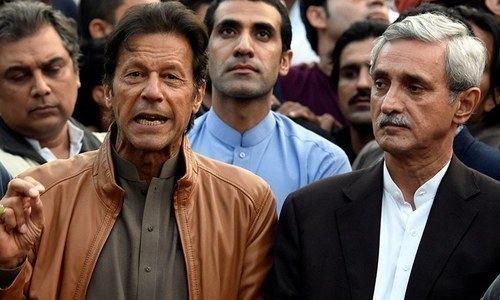ISLAMABAD: “They’re going to make him wait today, you’ll see,” a reporter remarks soon after I’ve made my way to the front of a crowded courtroom on the second floor of the Election Commission of Pakistan (ECP) building.
Imran Khan is already in the front row with Babar Awan and Jahangir Tareen in tow; Shafqat Mehmood, Naeemul Haq and Faisal Javed are seated nearby, but Fawad Chaudhry struggles to find a seat.
The bench, led by Chief Election Commissioner (CEC) Sardar Mohammad Raza Khan, has taken up the only other case on the docket; an affair so forgettable most reporters in the room don’t even bother taking notes.
See: Contempt petitions against Imran Khan dropped after ECP accepts apology
Case files relating to the contempt petition are placed before them by court officials and the bench takes its time to peruse the material before the call rings out: “Contempt petition filed by Akbar S. Babar against Imran Khan”.
There is a brief scramble as both Babar Awan and Ahmed Hassan — the petitioner’s counsel — make their way to the rostrum.
In his opening statement, the former tries to convince the bench that Mr Khan has only the utmost reverence for all national institutions and would never dream of breaching their respect.
But when the bench asks if his client is ready to apologise, Mr Awan keeps insisting that he has already done so in two previous submissions to the court.
Akbar S. Babar, standing just behind the arguing counsel, rolls his eyes repeatedly. The CEC too is eager to get a direct answer.
“Do you say sorry?”
“I say sorry three times.”
“What about this,” Justice Raza asks him, waving a copy of the contemptuous submission that sparked the entire episode.
“This was withdrawn,” Mr Awan responds.
This seems to satisfy the bench, and that matter stands settled. Now comes the question of Mr Khan’s more recent outburst against the commission; remarks made at an event in Karachi on Sept 20.
Aware of how damning the speech was, Mr Awan is reluctant to read out the text of Mr Khan’s tirade, insisting: “There has to be some respect between myself and the bench.”
He keeps going off on a tangent, first arguing that this should not be treated as a separate case, but clubbed with the previous matter so that the apology tendered there can be considered an apology in this matter as well.
When the bench refuses to entertain this request, he seeks more time to file a wakalatnama in the separate case. The bench, however, is in no mood to let the matter linger: this is the first time Imran Khan has appeared before the ECP in any matter even remotely connected to the foreign funding case that it is seized with, and they seem determined to have him supplicate, there and then.
The CEC suggests Mr Khan tender a written apology, a suggestion the counsel readily agrees to. This is followed by an over 20-minute huddle.
His legal advisers, party members and security detail form a ring around Mr Khan, like a Roman phalanx getting into formation. This keeps Mr Khan’s body language hidden from the bench and the eyes and ears of the dozens of reporters desperately trying to overhear the exchange between client and attorney.
When he finally does produce a signed statement, it raises eyebrows among the bench, which asks: “Where is the apology?”
“I have referred to the earlier apology in my opening line...” Mr Awan begins, but is cut off by Justice Raza, who tells him to forget about the earlier matter and focus on the case at hand.
Annoyed by his opposing counsel’s refusal to read the offending words that have become the basis of the second dispute, Ahmed Hassan begins to read out Mr Khan’s remarks.
This causes a stir among the Pakistan Tehreek-i-Insaf camp and Jahangir Tareen rubs his temples. Mr Khan too is agitated and leans over to Fawad Chaudhry, ostensibly asking why his remarks are being repeated before the court.
This triggers something in Mr Awan, who becomes confrontational with the bench. “I will not be party to your wishes,” he retorts when the CEC asks him to repeat Mr Khan’s offending quotes.
The ECP members’ exemplary restraint does not go unnoticed among the press corps. “He’s making things harder for Imran Khan,” says a veteran correspondent for a Sindhi paper.
Until now, the bench has been willing to hear an apology. But when Justice Raza brandishes a paper containing the charges against his client, Mr Awan retreats into another scrum with his party chief.
More consultations ensue, and the huddle yields another written statement, also signed by Mr Khan.
The bench glances at it and members nod to each other; they seem satisfied, but that is not what everybody came to see.
Justice Shakeel Baloch, the member from Balochistan, invites Mr Khan to the rostrum, giving voice to the silent wishes of all those in attendance.
The PTI chief justifies his outburst, explains the context of his remarks and insists that he meant his criticism of the ECP to be constructive. As soon as he finishes, the bench rises for the day; all is forgiven and their work here is done.
Published in Dawn, October 27th, 2017
















































